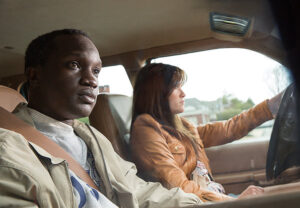It would be easy to dismiss “The Good Lie” as manipulative, a movie aimed at the tear ducts (and we all know you can’t trust a movie about emotions).
But while Philippe Falardeau’s film is not ground-breaking or earth-shaking, it’s still a touching, sometimes powerful tale of the strength of family bonds, even in the face of the most inhuman conditions.
A fictional tale set against a real backdrop, Margaret Nagle’s script tells the story of trio of brothers and sisters who live in remote villages of Sudan. It’s the 1980s and, while the world looks away, millions are fleeing the genocide of civil war by trekking to Kenya.
The Dengs – Theo, Mamere and Abital – are children who are orphaned in a rebel attack. They head for the border, teaming up with other youngsters and joining a river of humanity seeking safety. Eventually arriving at a refugee camp, they wait more than a dozen years before being chosen in a lottery for asylum in the U.S., sponsored by a religious relief organization.
But at this point, their number has dwindled to four, including Mamere (Arnold Oceng) and Abital (Kuoth Wiel), along with Paul (Emmanual Jal) and Jeremiah (Ger Duany), with whom they have banded since their escape. Because she is a single woman, Abital must stay in Boston; the relief organization couldn’t find a family to take her in Kansas City, where the three men are sent.
It’s at that point, halfway into the film, that we meet Reese Witherspoon, Corey Stoll and the other American actors. But after they enter the film, thankfully, they don’t take it over. Rather, they act as plot facilitators and sounding boards for these young men.
This review continues on my website.

